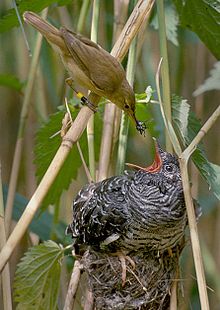Wikipedia:Cuckoo editing
This is an essay. It contains the advice or opinions of one or more Wikipedia contributors. This page is not an encyclopedia article, nor is it one of Wikipedia's policies or guidelines, as it has not been thoroughly vetted by the community. Some essays represent widespread norms; others only represent minority viewpoints. |
| This page in a nutshell: Cuckoo editing means inserting new content between an earlier statement and its supporting reference, thereby borrowing the earlier statement's legitimacy. |

Cuckoo editing refers (well, it does now!) to the practice of inserting unverifiable or false new content into an existing, referenced statement, thereby hijacking the existing statement's reference to provide legitimacy for the new content.
Cuckoo editing may be done in good faith, or maliciously. In either event, the inserted content cannot be verified from the inline citation that has now been hijacked. Nevertheless, it appears to be valid and properly supported. Cuckoo edits may therefore remain unnoticed within an article for much longer than might a simple, uncited addition, and thus mislead the reader for longer, too.
Etymology[edit]
The 'cuckoo' reference comes from the said bird's brood parasite practice of laying its egg in another bird's nest, resulting in its offspring being looked after by the host bird. In other words, it places its egg between the host parents and their egg, thus hijacking the food supply intended for their own chick(s).
There is some dubious evidence[1] of the term being used with a similar meaning in the parallel, extra-Wikipedia universe known as 'real life'. Despite being a blatant WP:NEOLOGISM, a number of experienced editors have suggested the term is wholly relevant to how some editors tend to operate on Wikipedia, and that they intend to use it.[2]
Examples[edit]
Hypothetical[edit]
Let's assume there exists a statement in the article on the Moon, backed up by a solid reference:
The Moon is the Earth's only natural satellite.[3]
Then someone inserts a bit more:
The Moon is the Earth's only natural satellite. It is entirely made of cheese.[3]
Now it looks as if the source supports the added statement instead of, or at best in addition to, the original one.
It is important to note that this isn't simply a case of adding an unsourced statement. It is adding an unsourced statement in such a way as to appropriate a reference belonging to another statement.
Following the cuckoo analogy, this could in time even develop to the next stage, where the original chick's legitimacy becomes questioned:
The Moon is the Earth's only natural satellite.[citation needed] It is entirely made of cheese.[3]
Actual[edit]
This section is empty. You can help by adding to it. (November 2020) |
If you've found a good example, please insert here - ta muchly!
How could this happen?[edit]
At least three possibilities come to mind:
- Intentional: an unscrupulous editor with ulterior motives (!) wants to insert content, for which they know they couldn't possibly find a WP:RS reference, so they just nick someone else's.
- Unintentional: an editor who doesn't know or care about citing sources just plonks their contribution to wherever it seems to best fit, negligently (or at least inadvertently) breaking the original statement/reference connection.
- Natural: the editor laying the proverbial egg is an actual cuckoo and cannot help it.
So what?[edit]
While the moon/cheese example is obviously false to most readers (The Moon is made of green cheese notwithstanding), less blatant errors could go undetected. For example [here] (which, incidentally, is where the first known — to me, that is — use of the term 'cuckoo editing' occurred), the original statement was about a plant (and I'm slightly paraphrasing for simplicity):
...originating in Southeast Asia, and occurring widely elsewhere, having been introduced as an ornamental and fruit tree.[4]
A bit more was added:
...originating in Southeast Asia, and occurring widely elsewhere, having been introduced as an ornamental and fruit tree. It is native to India.[4]
Now what was a SE Asian plant has become Indian. Unless you happen to be a botanist and/or have access to the offline source cited, you might struggle to dispute that statement.
In this case, I came across the addition soon after it was made, while patrolling recent changes. Had I stumbled upon the article later, after some more edits had been done, this particular edit would have already become firmly established as part of the article. (Okay, I might have wondered why the plant was said to originate in both SE Asia and India, but I probably wouldn't have given it much thought.)
I would be astonished if that were the only example of cuckooing ever to have occurred. The cuckoos are almost certainly out there somewhere, and possibly in great numbers, but can we ever find them...?
See also[edit]
References[edit]
- ^ "Cuckoo". UrbanDictionary.com. Retrieved 21 November 2020.
- ^ "Wikipedia:Teahouse". Wikipedia. 22 November 2020. Retrieved 22 November 2020.
- ^ a b c "Earth's Moon". NASA.gov. Retrieved 21 November 2020.
- ^ a b Janick, Jules. Paull, Robert E. The Encyclopedia of Fruit & Nuts. Publisher: CABI 2008. ISBN 978-0-85199-638-7
